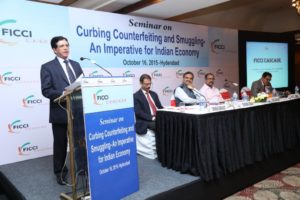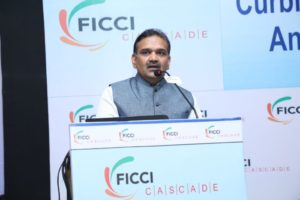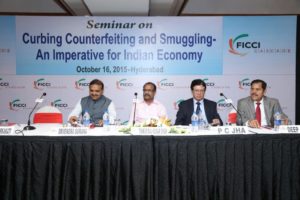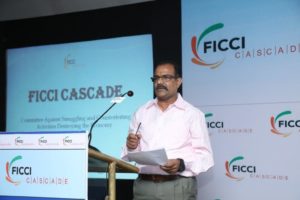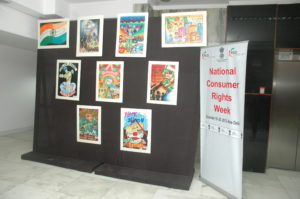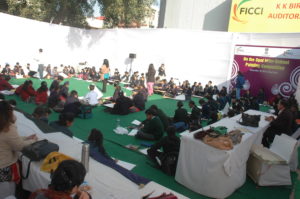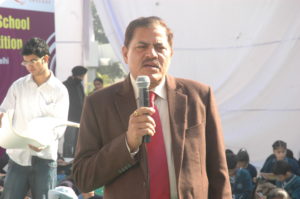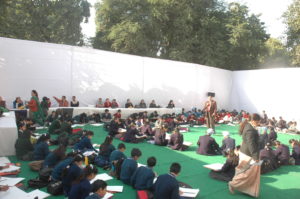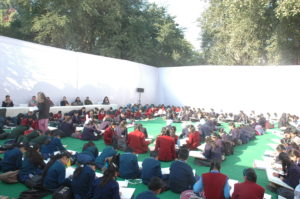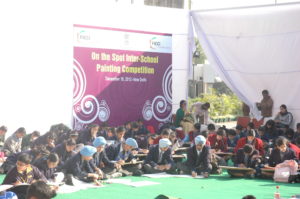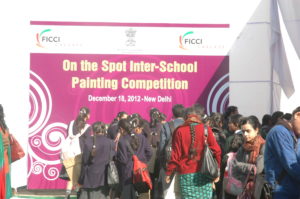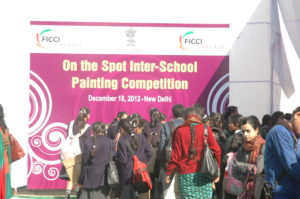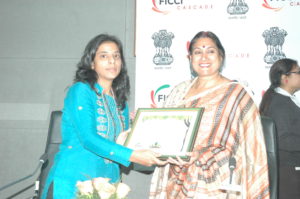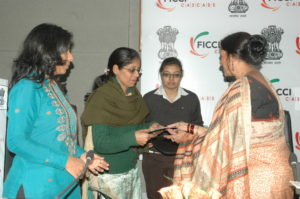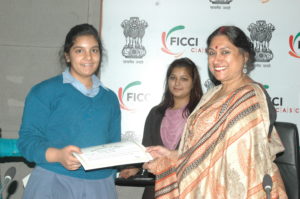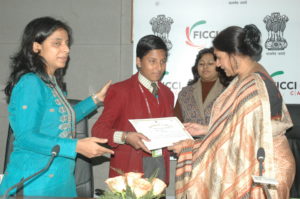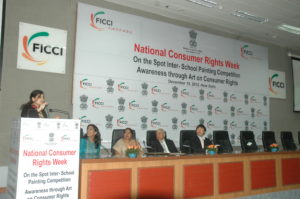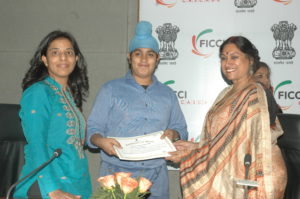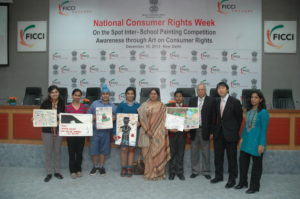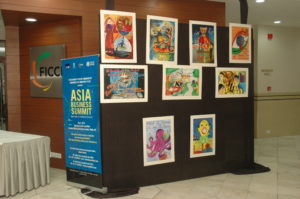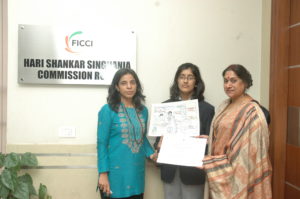9 arrested for smuggling meat with fake kosher symbols from the PA
Police forces arrested on Monday nine suspects who imported meat from South America that was meant to be transported to the PA, but instead ended up in Israel. According to the allegations, a network of Israeli and Palestinian Arab smugglers fraudulently brought the meat from the PA into Israel. The meat was reportedly marked with counterfeit kosher symbols.
http://www.israelnationalnews.com/News/Flash.aspx/356017#.VwYFWZx97IU
Lear MoreSeminar on ‘Curbing Counterfeiting and Smuggling – An Imperative for Indian Economy’, Hyderabad
10/16/2015 | Hyderabad
FICCI CASCADE with a view to engage all relevant stakeholders like government representatives, enforcement agencies, excise and customs, consumer activists, media as well as industry and legal experts; and to sensitize them on the issues of counterfeiting and smuggling organized a seminar in Hyderabad on “Curbing Counterfeiting and Smuggling – An Imperative for Indian Economy” on October 16, 2015. The seminar brought experts from different disciplines of life under one roof to raise the concern over the growing illicit trade and to create large-scale awareness among the impacted segments of the society.
Counterfeit trade has attracted considerable attention among trade associations, government and enterprises. Therefore, to support the cause, the seminar witnessed huge participation of over 80 delegates who were very enthusiastic to fight the menace.
Mr. Devendra Surana, Co-Chairman, FICCI Telangana & Andhra Pradesh State Council & Managing Director, Bhagyanagar India Ltd, welcomed the dignitaries and highlighted the objectives of the seminar like generating awareness, interaction with law enforcement agencies and sharing best practices. He said that the market for smuggled, counterfeits and contraband products was spreading rapidly and was one of the biggest challenges faced by the Indian industry. He further added that knowledge and innovation needed not only be protected but also encouraged.
FICCI CASCADE adviser Mr. P C Jha pointed out that counterfeiting was the biggest scourge impairing the world’s economy at present and it accounted for almost 10% of the current global trade. Mr. Jha discussed the magnitude of the problem and cited that in India the total loss to the government in respect of the seven items, as per a FICCI CASCADE study, had increased steeply from Rs. 26,190 crore to Rs. 39,239 crores. He highlighted the fact that loopholes in the taxation policy encouraged tax evasion leading to smuggling of goods. He also stated that counterfeiting wass the number one crime of 21st century. It stakes brand owner’s reputation, causes loss of revenue to the public exchequer, and poses a serious threat to the security – nationally and internationally.
The seminar also marked the enthusiastic and encouraging support of the Consumer rights activist Mr. Thakur Raj Kumar Singh, Chairperson & Managing Trustee, Human Rights & Consumer Protection Cell. Mr. Singh emphasized on the role of organizations like FICCI and appealed to the industry to help protect the “Consumer”. He underlined the fact that consumers were the ultimate victims of counterfeiting and smuggling, and their rights were being violated by counterfeiters and smugglers. He stressed on strengthening the penal provision to instill fear in counterfeiters and smugglers to curb the menace.
Mr Deep Chand, Adviser FICCI CASCADE and former Special Police Commissioner, Delhi Police, pointed out that the problem of counterfeiting and smuggling needed consumer support and active involvement towards the cause. Healso stressed on the need for registering complaints with the police and customs. Mr. Chand stated that the laws were adequate but the need was to put this evil as the priority agenda of the government while enforcing laws and regulations. He also said that problem of counterfeiting and smuggling gave rise to unscrupulous and anti-social elements in the society, creating a major security threat to the nation. Mr. Deep Chand emphasized on awareness among the stakeholders as a very important aspect in the enforcement of laws and appreciated FICCI CASCADE for its move to make a dent in this vast field which has remained unexplored so far.
Mr. Sunil Jain, Commissioner of Customs, Central Excise and Service Tax, Hyderabad Zone said that counterfeiting and smuggling continued to thrive globally due to the consumers’ propensity to acquire branded products at low cost, while the lack of awareness of the attached hazards added to this menace. Mr. Jain said that the role of customs has become more challenging with the growing sophistication in the manufacturing of counterfeit products. He invited the growing cooperation of the right holders to help the customs authorities for better management of the problem.
Mr. Srinivas Reddy, Deputy Inspector General of Police, Telangana expressed his concern towards the growing level of illicit trade and said that the problem could not be neglected. He also stated that smuggling, counterfeiting and other such illicit practices surreptitiously cascaded into national security issues like trade in narcotics, money laundering and terrorism. He cautioned the audience that our nation’s economic security was at stake and illicit economic activities were damaging the country’s economic vitality.
The subject of counterfeiting and smuggling is very vast and complex and there is a need to target and educate the masses to buy genuine products. The seminar witnessed vigorous interactions with delegates demonstrating an active interest in the issue. The seminar ended with a common view that the problem of counterfeiting and smuggling was multifaceted and complex and needed to be discussed time and again, with government, to emphasize on effective and adequate laws and enforcement; increasing engagement with the industry and, most importantly, creating awareness in the society to curb the menace of counterfeiting and smuggling.
Grimsby store owner fined £4k over stash of illicit cigarettes and tobacco
A SHOP owner has been fined £4,000 and ordered to pay £685 in costs and charges after Trading Standards officers from North East Lincolnshire Council found illicit cigarettes and tobacco during three separate visits.
DarbasMallah Hassan, 28, former owner of the Cornershop Newsagent and Slavika in Freeman Street, Grimsby, pleaded guilty to ten offences under the Consumer Protection Act 1987 and Trade Marks Act 1994 at Grimsby Magistrates’ Court .
Lear MoreCounterfeit goods easily available, but not always easy to spot
As the world has grown smaller, more and more foreign-made goods are hitting our shores. Among them, a flood of fakes, fueled in part by the Internet and the ease with which we can buy products directly.
Last year, US law enforcement agencies shut down nearly 30,000 websites that were illegally selling counterfeit merchandise online. Not only do fakes cost US businesses as much as $250 billion in lost trade annually, but many are also downright dangerous.
Lear More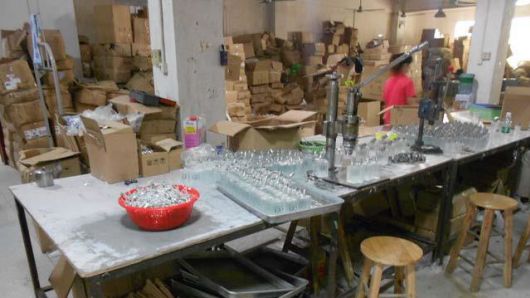
You’ll never guess what’s in these fake cosmetics!
Human urine, cyanide and rats’ droppings are just a handful of poisonous ingredients found in fake beauty products hitting the U.K., according to findings announced by the City of London Police.
It is estimated by the police that consumers in the U.K. spend at least £90 million ($141 million) each year on fake cosmetics, and this total is expected to rise dramatically as consumers shift more towards online shopping.
http://www.cnbc.com/id/102687332
Lear More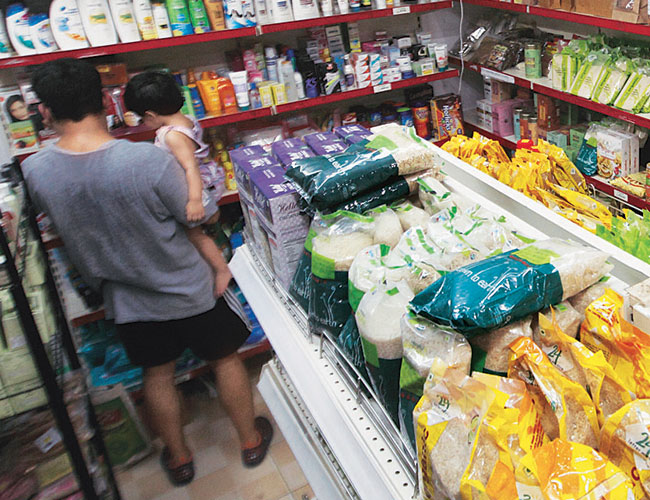
Fake organic brands thrive under FSSAI
The Food Safety and Standards Authority of India (FSSAI) has been issued a legal notice by the Crop Care Federation of India (CCFI) for issuing the ‘organic’ certificate and logo to companies caught cheating consumers. The federation, in its notice on January 3 , has blamed the food authority for letting “fake, wrongly labelled and misbranded organic products” deceive millions of consumers in India.
http://indiatoday.intoday.in/story/fake-organic-brands-thrive-under-fssai/1/413520.html
Lear MoreNigeria Loses About N15bn Annually To Counterfeit Products – SON
An estimated N15 billion is lost annually to fake or counterfeit products in terms of tax revenue to the government, income to local manufacturers and employment generation to Nigerians.
The director, Legal Services, Standards Organisation of Nigeria (SON), Suleiman Kawo, dropped this hint when the agency hosted the staff and management of the Nigeria Institute of Policy and Strategic Studies (NIPSS), Kuru, who came on a study tour of the agency in Abuja.
Lear More
Tobacco worth $24,000 stolen in Windham
WINDHAM – A young Windham-area family took a hit in the pocketbook this week when thieves cut a large hole in a pack barn and made off with 14 large bales of cured tobacco.
Each bale weighs 750 pounds. Total value of the theft is estimated at $24,000. Dan Fernandes and partner Kendle Columbus of Windham Road 6 were not insured. “I never thought in a million years that this would happen,” Fernandes said Thursday. “When I saw this my heart just sank.” The theft occurred in the early morning hours of Wednesday. Whoever did the crime was well-organized and brazen. The thieves drove several vehicles up to the rear of the pack barn, cut a large hole in the back of it, and made off with a large amount of tobacco. Fernandes, 30, was not insured. With his pack barn being less than 100 feet from his home, Fernandes didn’t think anyone would attempt an incursion like this. Fernandes was so confident about his situation that he decided this year not to pay the $700 premium to insure the contents of his pack barn. “Our offshore workers saw this and they were so upset,” said Columbus. “This was their hard work too. They had tears in their eyes. They asked ‘What kind of country is this?’” Const. Ed Sanchuk of the Norfolk OPP says a crew of six would have been capable of hoisting the bales onto a truck. He suspects the tobacco has been shipped to a blackmarket producer of contraband cigarettes.
Sanchuk noted this was the third theft of its kind in the tobacco belt in recent weeks. He said farmers and their neighbours need to band together and look out for suspicious activity on each other’s property. The OPP are interested in hearing reports of strangers snooping around farmyards or who come onto properties claiming to look for someone they believe lives in the area. Sanchuk said vehicle descriptions and licence numbers should be noted under these circumstances and passed along to police right away. Fred Neukamm of Aylmer, chair of the Ontario Flue-Cured Tobacco Growers Marketing Board, said growers should seek advice from the OPP if they have doubts about the security of their buildings. Neukamm added that growers should not confront the situation if they believe they have come upon a theft in progress. “Personal and family safety comes first,” Neukamm said. “The most appropriate advice is to phone 911 and ask for the police immediately.”
http://www.tillsonburgnews.
Bulgarian customs officers find fake perfumes worth over EUR 1 million, heroin worth over BGN 1 million
Svilengrad. Bulgarian customs officers at Svilengrad checkpoint have found fake perfumes worth over EUR 1 million and heroin worth over BGN 1 million in a container with empty jars, announced the National Customs Agency.The fake goods and drug were transported on rails from Turkey to Western Europe. According to its papers the container was transporting 22 pallets with empty jars from a company in Turkey to a company in the Netherlands. However, the ultimate unloading point was said to be a town in Germany. The discrepancy made the customs officers suspicious and they checked the container. Pallets with empty jars were hiding pallets covered with empty cardboard boxes to imitate a similar height. The customs officers found 18 pallets with a total of 30,000 packages of perfume and toilet water imitating 30 world famous trademarks, such as Boss, Chanel, Gucci, Dolce and Gabbana, Givenchy, Armani and Calvin Klein. They are estimated at EUR 1 million. This is the biggest amount of fake perfumes the customs officers have seized in the recent years.They also discovered that the cardboard perfume packages in two of the cardboard boxes contained plastic envelopes with a powder-like substance which tested positive for heroin. The drug weighs 8,5 kg in total and is worth over BGN 1 million.An investigating customs inspector is working on the case under the supervision of Haskovo District Prosecutor’s Office.
Lear More“Awareness through Art”,On the Spot Painting Competition on Consumer Rights, New Delhi
18/12/2012 | New Delhi
The National Consumer Week was flagged off with the “Awareness through Art” over 272 students participated from various schools of NCR Delhi in the Painting Competition on Consumer Rights.The competition focused on the detrimental effects of smuggled, counterfeit and fake goods on the health and safety of consumers, with specific topics like, “Say no to Fakes”, and “Does Black Money encourage crime in society?” The paintings by the students also brought to fore the steps, which can be taken by consumers to avoid being duped into purchasing these fake products, with topics like “Buying a product without receipt—Sensible or Dangerous” and “Be responsible: Insist on a bill”. The paintings by the students also brought to fore the steps, which can be taken by consumers to avoid being duped into purchasing these fake products. All the participating students were awarded certificates. Cash prizes were awrded to the 1st, 2nd and 3rd prize winners by Smt. Renu Agrawala.
Lear More



